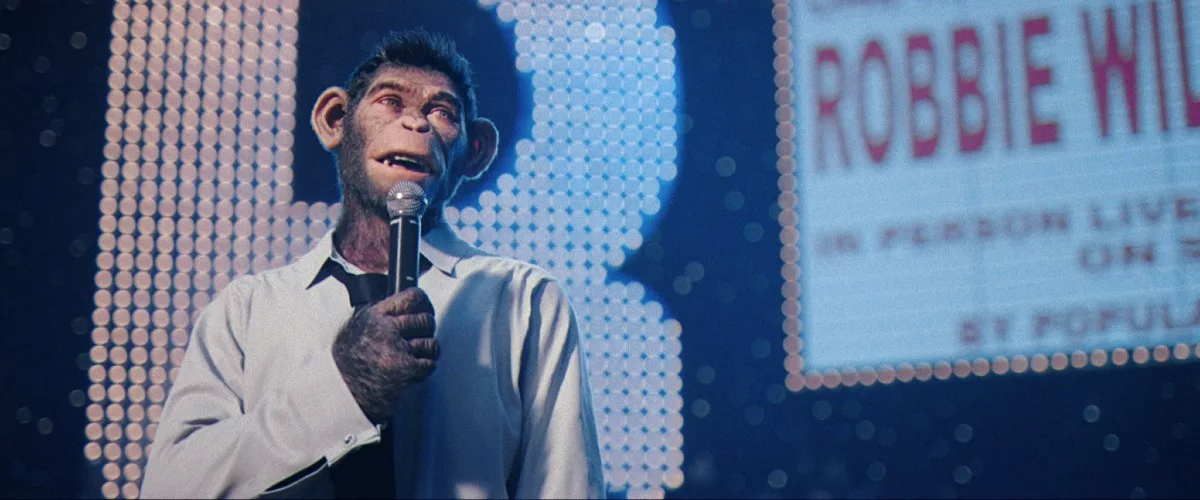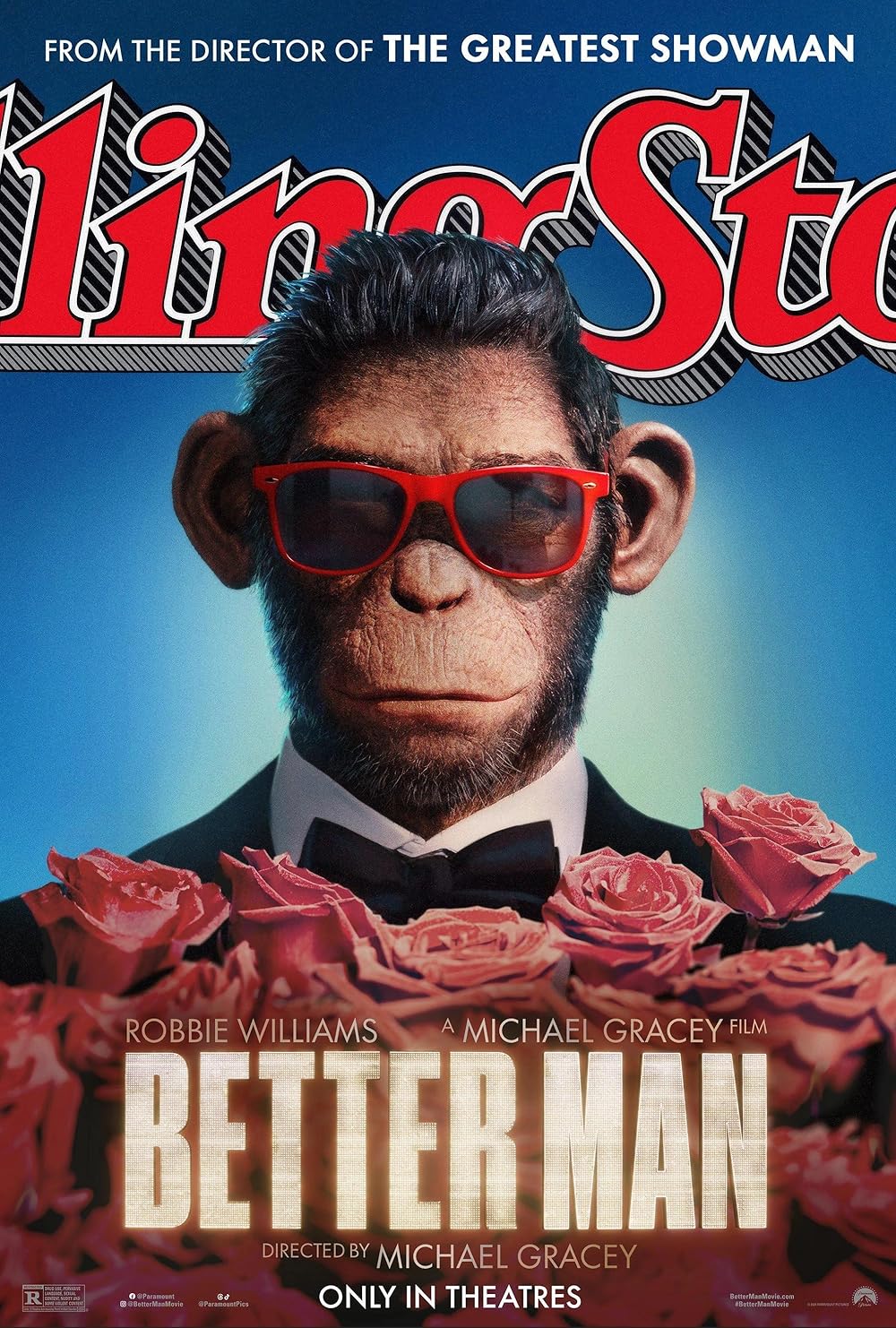Who is Robbie Williams? Sure, it’s the question most Yanks might ask when given the elevator pitch to “Better Man,” the latest from “The Greatest Showman” director Michael Gracey. (His meteoric success in the UK, both as a member of British boy band Take That and his own chart-topping solo career, never quite translated across the pond.) But in classic music biopic fashion, “Better Man” is also concerned with the kinds of man-behind-the-music insights required of these kinds of pictures: The rough, working-class childhood, the disapproving father figure, the rollercoaster of sex, drugs, and market forces that make and break our most iconic pop culture figures. But Gracey, Williams, and crew throw their mightiest curveball away from those tropes in the film’s opening seconds as Williams purrs in voiceover, “I want to show you how I really see myself”—an anthropomorphic monkey, rendered in pitch-perfect CGI. It’s “Planet of the Apes” meets “Top of the Pops,” and it’s just the first magic trick Gracey’s stirring, effective chronicle wants to throw your way.
Williams, after all, has described himself in interviews as feeling like a performing monkey, and a “little less evolved” than his fellow man; this bears out in his real life, as the youngest and brashest member of Take That, known for his public antics and well-documented history of drug use and partying. But the secret to the sauce is that Gracey, and “Better Man,” take this gimmick completely seriously: there’s very little lampshading, nor is there some transformative moment where he becomes the real Robbie Williams. This is the furry skin Williams feels trapped in, and every gesture bears that dissonance out. Aided by a smart, limber mo-cap performance from Jonno Davies (with Williams providing his own, soulful voiceover), the Williams we see on screen is as much a simulacrum as the real man, existing somewhere between man, beast, and computer creation. In all but a few moments, he acts and dresses like a person: only a few times does the film let a distressed Williams let out a howling screech or puff out his chest. “Better Man” is all about the gulf between how people see him and how he sees himself, and the ways his personal demons get in the way of enjoying the success his own ferocity earned him.
Gracey, whose flourishes made “The Greatest Showman” one of the biggest musical smashes of the century, finds the right balance between naturalism and sensationalism here. Some scenes play out like a Mike Leigh film; but then it’s off to another hyperactive, exuberant musical sequence that recontextualizes Williams’ deeply personal lyrics to mark specific high and low points in his life. Gracey’s staging is remarkable in its fluidity: Some recall the scrappy intimacy of “Sing Street,” others feel like action sequences. (“Come Undone” sees him racing away from Take That after his antics get him kicked out of the band; it warps from a “Fast and Furious”-level car chase to the evocative image of Williams drowning in a lake, surrounded by floating paparazzi who circle and flash around him like electric eels.). His set at Knebworth turns into an all-ape battle royale right out of “Love Death & Robots,” as Williams literally fights off his demons.
But the real showstopper is “Rock DJ,” a foot-stomping one-shot sequence that takes us through several eras of Take That’s meteoric rise, featuring hundreds of dancers filling Regent Street as the band spins and transitions from one iconic costume change to another. If you see no other scene from this film, watch this. It’s remarkable. It’s evocative of Dexter Fletcher’s admirable work on “Rocketman,” another warts-and-sequins-and-all account of a famous British pop star that took bold swings to escape the quicksand of the biopic’s typical rhythms.
Where “Better Man” threatens to lose steam is when it apes the structural patterns of other music biopics: the rise-fall-rise of his success can get a little repetitive in theory, as he forges his musical identity, engages in his own Lennon-McCartney feud with Take That fremesis Gary Barlow (Jake Simmance), finds and loses love, and claws back to the limelight. But Gracey fusses with the staging to keep us interested. Williams’ demons come out in the form of intrusive-thought copies of himself staring out at him from the crowd; they haunt him and fill him with self-doubt, which sends him running to booze, coke, and groupies, to the chagrin of his girlfriend, All Saints’ Nicole Appleton (Raechelle Banno, doing a lot with a little here). That this, as Dewey Cox would say, dark period is playing out with a CG monkey instead of the real McCoy feels oddly fitting; Williams gets to play the pathos, while leaving a knowing remove from both his real image and the audience itself. It’s a smart move that lets him vulnerably share his lows while underplaying the pomp and circumstance of his highs.
It helps, of course, that Williams takes a tongue-in-cheek approach to his own legend, always half-grappling with the feeling that he was never quite meant to be this famous. There’s just enough of a satirical bent here to shake it loose from the genre’s trappings, without turning it fully into “Weird: The Al Yankovic Story.” It’s ridiculous, because Robbie is ridiculous, and he’d have it no other way. Even in his lowest moments, Williams is ready to recognize the innate absurdity of his woes: his rock bottom takes shape as a monkey weeping over lines of coke while dressed in a space-age fat-sucking vacuum suit.
You won’t see another music biopic quite like “Better Man,” regardless of your level of familiarity with its subject. There’s a surfeit of charm here that helps sell the nonsensical gimmick; Gracey moves us fast enough through the Cliff’s Notes of Williams’ life that you barely stop to process the image of a fully-dressed chimpanzee getting a handjob from a groupie in a nightclub. To say nothing of the curious sensation of welling up at a tuxedoed ape belting “My Way” as a spiritual reclamation of his own celebrity. It’s brash, in your face, and on the nose. But that’s Robbie Williams. Could a biopic of him play out any other way? C’mon. Let him entertain you.




















